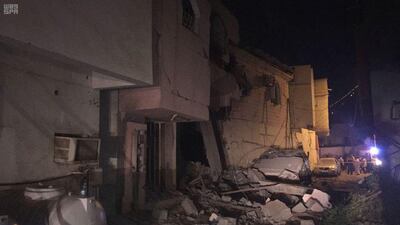Saudi Arabia intercepted a ballistic missile fired by Yemen's Houthi rebels on Wednesday, but shrapnel killed a Yemeni man and wounded 11 others in the southern Saudi city of Jazan, the Arab Coalition said.
The missile was fired from Amran province in northern Yemen on Wednesday night, the coalition said in a statement published by the Saudi Press Agency.
"Shrapnel from the intercepted missile scattered over residential areas, martyring a Yemeni resident and wounding 11," said Col Turki Al Malki, spokesman for the Saudi-led coalition supporting Yemen's government.
The attack on Jazan was the second ballistic missile fired at Saudi Arabia by the Iran-backed rebels this week. On Monday, Saudi forces intercepted a missile launched from Amran towards civilian areas in Najran. No damage was reported.
Col Al Malki said the coalition struck back on Thursday at the Houthis responsible for the attack on Jazan. The military action in Saada province, which lies between Amran and Saudi Arabia, was in line with international humanitarian law, he said.
"The coalition will take all necessary measures against the terrorist, criminal acts of the terrorist Iranian-Houthi militia, such as recruiting child soldiers, throwing them in battlefields and using them as tools and covers to their terrorist acts," Col Al Malki said.
He said the leaders and militants responsible for launching ballistic missiles and targeting civilians would be held accountable as part of the coalition's efforts to prevent terrorist elements from compromising regional and international security.
___________
Read more
Houthis using children as human shields in Yemen's Al Hodeidah, Arab coalition says
Saudi Arabia intercepts new Houthi missile from Yemen
___________
The Iran-backed rebels have in recent months ramped up missile attacks against Saudi Arabia, most of which are intercepted. Three civilians were killed by a Houthi missile fired at Jazan in June.
The coalition said Wednesday's attack brought the tally of rebel missiles launched since 2015, the year it joined the Yemeni government's fight against the rebels, to 165.
The Houthis seized the capital, Sanaa, in 2014 and overthrew the internationally recognised government led by President Abdrabu Mansur Hadi during a transition of power from former president Ali Abdullah Saleh.
Saudi Arabia, the UAE and their allies in the Arab Coalition intervened in the conflict at the request of Mr Hadi's government.
Investigations by the UN and the US have found evidence that the missiles fired by the Houthis were supplied by Tehran.
Meanwhile, elite pro-government forces in Shabwa launched an operation on Wednesday to disarm residents in the south-eastern province.
Many of Yemen’s tribes remain heavily armed, with some weapons passed down through generations from previous conflicts. They comprise mostly AK-47s and small arms, but in some cases authorities have found heavy machine guns and bombs, in particular since Al Qaeda established a presence in the country in 2011.
The move comes as part of a larger sweep to disarm the east of Yemen and clear the area of Al Qaeda and ISIS.
"We are trying to get rid of the arms manifestations in the province, and to carry on the efforts exerted by the UAE to counter the terrorism groups in Yemen," Col Mohammed Salem Al Buhar, commander of the elite forces in Shabwa, told The National.
The first day of the campaign rounded up 500 weapons from tribal members in the area, said Col Al Buhar.
The operation will be extended to all districts of Shabwa and neighbouring provinces such as Abyan and Aden, the interim capital.
Aden still contains thousands of weapons from decades of conflict, according to Col Al Buhar. Residents remain apprehensive of disarmament because of lack of confidence in the authorities.
The war in the Arab world's poorest country has left nearly 10,000 people dead and triggered what the UN describes as the world's worst humanitarian crisis.
Earlier this week, the UN Special Envoy for Yemen, Martin Griffiths, convened a consultative meeting in the UK of 22 Yemeni public figures and women activists as part of his efforts to end the war.
The meeting on Tuesday and Wednesday discussed the renewal of the political process, with Mr Griffiths hoping to resume talks in Geneva next month.
“The main purpose of the meeting is to have the opportunity to consult with Yemeni social and political figures who possess a unique knowledge of the Yemeni society”, said Mr Griffiths, who chaired the meeting.
He said a negotiated political settlement through inclusive intra-Yemeni dialogue was the only way to end the conflict and address the ongoing humanitarian crisis.

